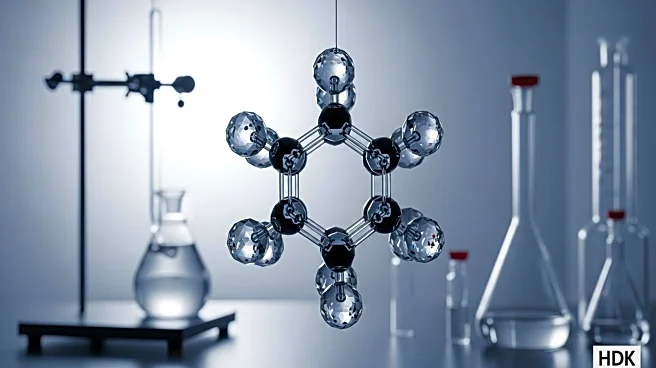What is the story about?
What's Happening?
Three scientists, Susumu Kitagawa, Richard Robson, and Omar M. Yaghi, have been awarded the Nobel Prize in Chemistry for their pioneering work in developing metal-organic frameworks. These structures are capable of trapping large quantities of gas, offering potential solutions to significant global challenges such as greenhouse gas reduction and water scarcity. The frameworks, likened to magical bags from the 'Harry Potter' series, can hold vast amounts of gas or liquid despite their small size. This innovation allows for precise control over the storage of specific molecules, such as carbon dioxide or methane, which is rare in chemistry. The scientists' work, which began with Robson's research in the 1980s, has led to the creation of stable atomic structures with customizable holes that can efficiently store gases.
Why It's Important?
The development of metal-organic frameworks has significant implications for addressing environmental and industrial challenges. These structures could be instrumental in removing greenhouse gases from the atmosphere, thus contributing to efforts against climate change. Additionally, they hold potential for harvesting moisture from desert air, providing clean drinking water in arid regions. The frameworks could also be used in targeted drug delivery and in separating harmful 'forever chemicals' from water. The ability to store toxic gases efficiently could help mitigate pollution from industrial sites, making this discovery a crucial tool in global environmental management.
What's Next?
Researchers worldwide are expected to continue exploring the applications of these frameworks in various fields. Potential developments include enhancing the frameworks' efficiency in capturing and storing gases, as well as expanding their use in medical and environmental technologies. The scientific community may also focus on integrating these structures into existing industrial processes to improve sustainability and reduce environmental impact. As the frameworks gain recognition, further research and development could lead to new innovations in chemistry and environmental science.
Beyond the Headlines
The ethical and environmental implications of this discovery are profound. By providing a method to capture and store greenhouse gases, these frameworks could play a pivotal role in global efforts to combat climate change. Additionally, their potential use in water purification and pollution control highlights the intersection of scientific innovation and environmental stewardship. As these technologies develop, they may also prompt discussions on the responsible use and management of such powerful tools in addressing global challenges.
















